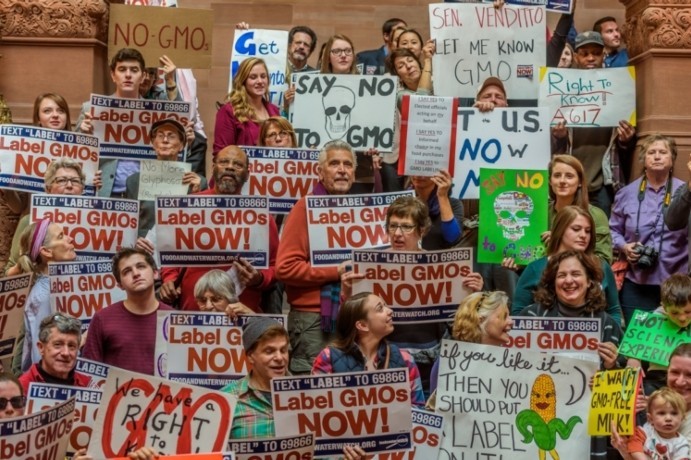Completed the most extensive study of the effects of GMO on human health
 Genetically modified organisms (GMOs) - organisms whose genotype is artificially modified using genetic engineering methods. The changes were made deliberately, for example, in the case of crops - increasing yields, improving the taste and nutritional values of products, resistance to pests, etc.
Genetically modified organisms (GMOs) - organisms whose genotype is artificially modified using genetic engineering methods. The changes were made deliberately, for example, in the case of crops - increasing yields, improving the taste and nutritional values of products, resistance to pests, etc.In 2015, genetically modified crops accounted for 99% of the sugar beet harvested in the USA, 94% of soybeans, 94% of cotton, and 92% of fodder corn.
In the world, 12% of all arable land is occupied by GM crops.
')
Since the 1970s, scientists have been studying the potential risks associated with the use of GMOs. To clarify this issue, the American Academies of Sciences, Engineering and Medicine have organized the most extensive study to date of nearly 900 scientific articles published in the last 30 years on the effects of GM crops on the human body and the environment. The analysis of the articles lasted two years by a committee of 50 scientists, researchers and specialists from agriculture and biotechnology. The document was reviewed by 26 independent experts.
And finally, the work is finished: on May 17, a 400-page report was published in open access, and all accompanying documents were posted on a specially created website .
According to the results of the research, no signs of the negative influence of GM products on human health were found in hundreds of scientific papers. Consuming GM foods does not correlate with cancer, obesity, diabetes, gastrointestinal diseases, kidney diseases, autism, or allergies. There is no established long-term increase in morbidity after the mass distribution of food from GM crops in the United States and Canada in the 1990s.
Moreover, some evidence was found of the positive effect of GMOs on human health due to a reduction in the number of insecticidal poisonings and an increase in the level of vitamins in the population of developing countries.
In addition to the impact on health, two other important aspects of the use of GMO crops were carefully analyzed: their environmental impact and importance for farms.
"The use of insect-resistant and herbicide cultures does not reduce the overall diversity of flora and fauna, and insect-resistant cultures sometimes increase it," this conclusion of the study regarding the influence of GMOs on the environment.
One of the common fears about GMOs that artificial genes will penetrate into the wild has also proved to be groundless. Although research has shown that this process is possible, no adverse effects from gene transfer have been found.
In the end, the study of the yield and profitability of farms also did not reveal any disturbing trends. Corporations sell GM crops to farmers at an elevated price and prohibit breeding them themselves, as they are protected by patents. But losses are more than offset by higher yields and other benefits that farmers receive.
Scientists cannot find any signs of harm to GMOs, but public opinion still negatively perceives genetic engineering. The majority of the population of the United States, the EU, Russia and other countries fear that GMO products are a health hazard. This mistake is actively used by food manufacturers who promote their products with the mark “ Non-GMO ”, including table salt and other products that are not related to genetically modified crops. This mark has become a marketing tool for differentiation in the market.
Regulators and legislative bodies are also forced to listen to public opinion, so that the use of GMOs in agriculture is still rather tightly regulated.

It is unlikely that the published report “Genetically Engineered Crops: Experiences and Prospects (2016)” will put an end to the argument of supporters and opponents of GMOs: “This is an emotional question, not a scientific problem,” says food analyst Phil in comments for USA Today .
Genetically Engineered Crops: Experiences and Prospects (2016)
Source: https://habr.com/ru/post/394327/
All Articles